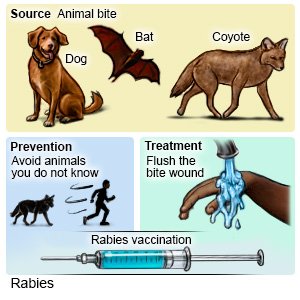Rabies
Medically reviewed by Drugs.com. Last updated on Apr 6, 2025.
Rabies is a disease that affects the body's central nervous system (brain, spinal cord, and nerves). Rabies is caused by a virus. You may get the virus if you come into contact with the saliva or other tissue of an infected animal. Rabies infection usually happens through a bite wound. Animals that may spread rabies include dogs, cats, coyotes, raccoons, foxes, skunks, and bats. Rabies develops when the virus enters the skin and goes to the muscles or nerves.
DISCHARGE INSTRUCTIONS:
Call your local emergency number (911 in the US) or have someone else call if:
- You have trouble swallowing or slurred speech.
- You have double vision, or you see things that are not really there.
- You begin twitching, have muscle cramps, or have a seizure.
Return to the emergency department if:
- You think you were exposed to rabies.
- You were bitten by an animal. Clean the wound as soon after the bite as possible.
- You feel weak, tired, dizzy, confused, restless, or anxious.
Call your doctor if:
- You have a fever.
- Your signs and symptoms do not get better after treatment.
- You have questions or concerns about rabies and rabies treatment.
Medicines:
You may need any of the following:
- Medicines such as the rabies vaccine or immune globulin may be given. These medicines help your body fight the virus and prevent rabies. Medicines may be given to help control seizures, treat a viral infection, or decrease inflammation.
- Prescription pain medicine may be given. Ask your healthcare provider how to take this medicine safely. Some prescription pain medicines contain acetaminophen. Do not take other medicines that contain acetaminophen without talking to your healthcare provider. Too much acetaminophen may cause liver damage. Prescription pain medicine may cause constipation. Ask your healthcare provider how to prevent or treat constipation.
- Take your medicine as directed. Contact your healthcare provider if you think your medicine is not helping or if you have side effects. Tell your provider if you are allergic to any medicine. Keep a list of the medicines, vitamins, and herbs you take. Include the amounts, and when and why you take them. Bring the list or the pill bottles to follow-up visits. Carry your medicine list with you in case of an emergency.
If an animal that can carry rabies bites you:
- Clean the bite wound. Clean the bite wound for at least 5 minutes. Use soap and water, or povidone-iodine solution mixed with water. Do this right after you are bitten to lower the risks for a wound infection and rabies. Cover the wound with a clean bandage to prevent infection.
- Seek care right away. Healthcare providers may need to treat the wound and close it with stitches. You may need to take antibiotics to help fight or treat a bacterial infection. The rabies vaccine series may be started immediately.
Prevent rabies:
- Ask your healthcare provider about the rabies vaccine. You may need the vaccine if your risk for rabies is increased through work or travel. You will be given 2 doses a week apart. You may need a booster dose within 3 years after the first 2 doses.
- Avoid contact with animals. Do not approach any wild animal, or any tame animal that you do not know. Cover windows and other openings in your home with screens so wild animals cannot get inside.
- Get medical care if you get bitten by an animal. Do this even if the wound is very small.
- Get your pet vaccinated against rabies. You will need to do this every 3 years or as directed by your veterinarian.
 |
Follow up with your doctor as directed:
Write down your questions so you remember to ask them during your visits.
© Copyright Merative 2025 Information is for End User's use only and may not be sold, redistributed or otherwise used for commercial purposes.
The above information is an educational aid only. It is not intended as medical advice for individual conditions or treatments. Talk to your doctor, nurse or pharmacist before following any medical regimen to see if it is safe and effective for you.
Learn more about Rabies
Treatment options
Care guides
Further information
Always consult your healthcare provider to ensure the information displayed on this page applies to your personal circumstances.
